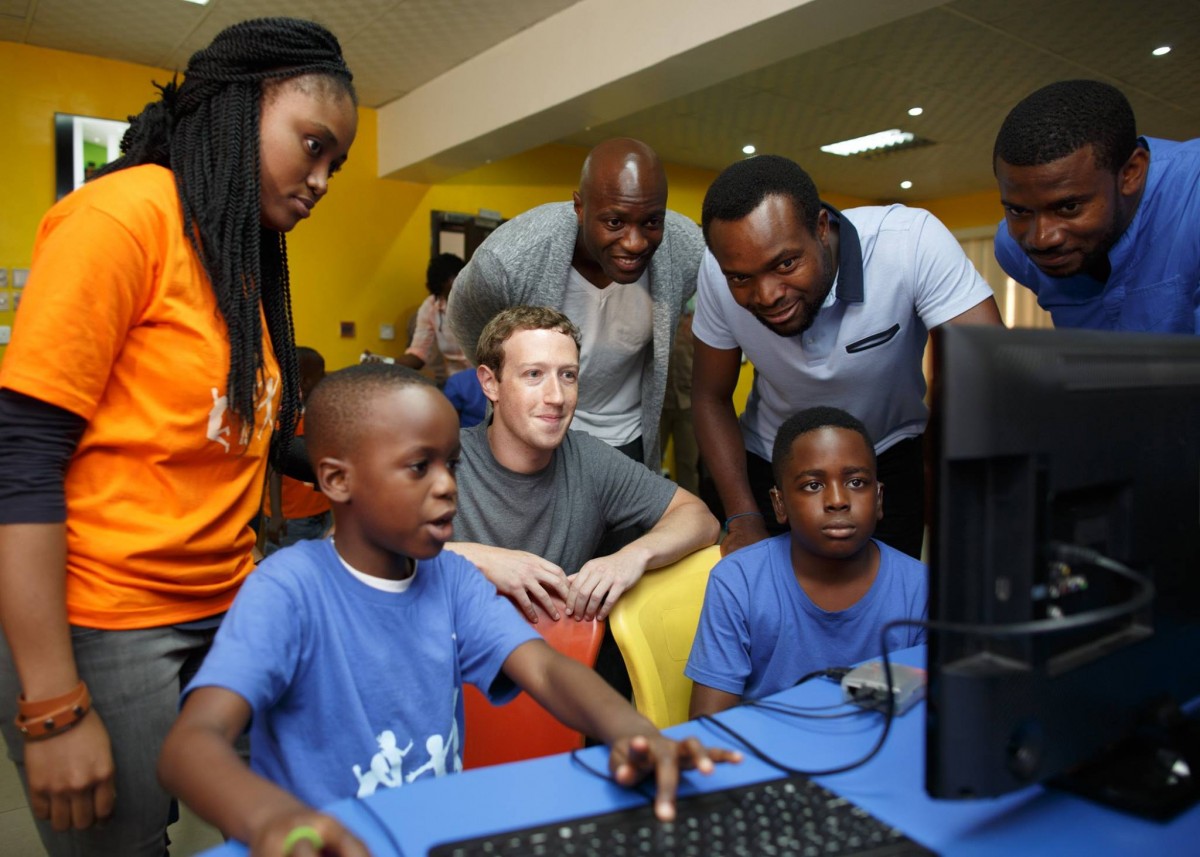
Facebook’s Zuckerberg Visits Nigeria On First Sub-Saharan Africa Trip by Toby Shapshak
One his first trip to sub-Saharan Africa Facebook CEO Mark Zuckerberg has made a surprise visit to Nigeria, Africa’s most populace nation (170-milllion people) and Facebook’s largest market with 16-million users.
“This is my first trip to sub-Saharan Africa,” Zuckerberg said in a Facebook post. “I’ll be meeting with developers and entrepreneurs, and learning about the startup ecosystem in Nigeria. The energy here is amazing and I’m excited to learn as much as I can.”
“Our first stop is the Co-creation Hub Nigeria (CcHUB) in Yaba. I got to talk to kids at a summer coding camp and entrepreneurs who come to CcHub to build and launch their apps. I’m looking forward to meeting more people here!” Zuckerberg wrote. He has 42-million followers on Facebook.
Yaba is in the capital Lagos and is considered the closest to a Silicon Valley, and is home to CcHUB, which wrote on its Facebook page: “We were Mark Zuckerberg’s FIRST STOP on his FIRST TRIP EVER to Sub-Saharan Africa. Can you beat that??? Awesome time hosting a genuine world changer…”
Facebook said in a statement that “Zuckerberg is in Nigeria to listen and learn and take ideas back to California on how Facebook can better support tech development and entrepreneurship across Africa.”
Facebook has a keen interest in Africa, which is seen by many as the new growth market as more and more consumers come online using mobile devices. The vast majority of Facebook users in Nigeria – and through Africa – are on mobile. Africa has the world’s fastest-growing mobile market, according to the GSMA, and has grown to half a billion users.
Nigeria’s monthly active users (MAU) on Facebook have grown to 16-million (from 15-million) which is a 6.67% increase, as of the first quarter of 2016, according to figures released by Facebook in June. Kenya has 5.3-million (up from 4.3-million or 18.6%). Just less than half of these figures in Nigeria are daily active users (DAU), and just less in Nigeria.
Underlying the mobile nature of the market, about 90% of South Africa’s monthly users are on mobile, and 95% of daily users. Some 8-million people use Facebook daily in South Africa, or 62%. Some 14-million South Africans use Facebook every month, an 16.6% increase in the year since it last released figures in June 2015.
When she visited South Africa last year after the opening of the first office in Africa in June, Nicola Mendelsohn, Facebook’s vice president for Europe, Middle East and Africa, told me: “This is one of the places where our next billion users are coming from”.
“It would be a massive missed opportunity. Africa matters,” she added. At the time, Facebook said it had 120-million active users, of which 80% (or 96 million) use their mobile phones. These figures, from June 2015, were the last full set of numbers for the continent that Facebook released. They were a 20% increase from the previous batch released in September 2014.
Facebook provides free access to a stripped down version of the social network that is better suited to feature phones with poor internet connectivity, called Free Basics. A remarkable South African organisation, run by Gustav Praekelt, is a key provider of these.
“CcHub opened in 2011 and at the time didn’t even have an office. Five years later they fill three floors and the roof of a building. At CcHub people can learn how to code, developers can get help launching their first products, and find mentors and funding,” Facebook said in a statement.
“At CcHub Zuckerberg met with developers like Temi Giwa, who runs a platform called Life Bank that makes blood available when and where it is needed in Nigeria. Life Bank saves lives by mobilizing blood donations, taking inventory of all blood available in the country, and delivering blood in the right condition to where it is needed.”
Zuckerberg then visited Andela, “an engineering organization that is building the next generation of technical leaders in Africa. Andela is a business that recruits the most talented technologists in Africa and shapes them into world-class developers through a four-year technical leadership program,” Facebook said.
“In the two years since it was founded, Andela has accepted just over 200 engineers from a pool of more than 40,000 applicants. Andela developers spend six months mastering a technical stack and contributing to open source projects before being placed with global technology companies as full-time, distributed teammates, working out of Andela headquarters in Lagos and Nairobi.”
The Chan Zuckerberg Initiative invested in Andela earlier this year. This was “after being impressed by the company’s innovative model of learning and its drive to connect the global technology ecosystem with the most talented developers in Africa.”
Andela Lagos director Seni Sulyman said: “We are excited and honored to welcome Mark Zuckerberg to Lagos. His visit reinforces not only his support of Andela’s mission, but his belief that indeed the next generation of great technology leaders will come out of Lagos, Nigeria and cities across Africa. Andela has created a platform for passionate, driven software developers and engineers to break into the global tech ecosystem, but the barriers to entry are still very high. Mark’s visit demonstrates to all Nigerian developers and entrepreneurs that they’ve caught the attention of the tech world, and they are capable of succeeding on a truly global level.”
“At the end of the day Zuckerberg stopped by an Express WiFi stand in Lagos owned by Rosemary Njoku. Facebook’s Express WiFi lets entrepreneurs like Rosemary set up a hot spot to help their community access apps and services built by local developers.”
Shapshak is editor-in-chief and publisher of Stuff magazine. Based in Johannesburg, his TED talk on innovation in Africa has had more than 1.4m views.


Sorry, the comment form is closed at this time.